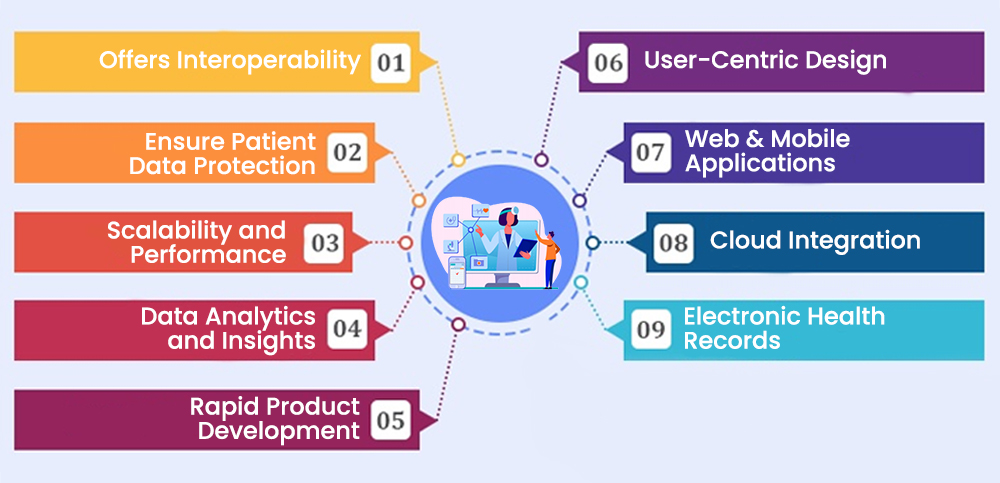Why Choose .Net Framework For Building Healthcare Software Solutions?
Table Of Content
Published Date :
23 Nov 2023
Are you wondering why use .Net framework for building healthcare software development? The answer is simple. Microsoft .Net is a versatile framework that can be used by software engineers to develop an array of applications with robust functionalities. The framework is especially useful for building enterprise-level software that requires cross-platform compatibilities, or projects that must be easily scalable.
For instance, healthcare organizations require robust mobile applications and software platforms to process large amounts of patient data and deliver high degree of functionality. The implementation of EMRs, Telehealth and Telemedicine platforms, etc. within the healthcare ecosystem demands a secure and highly efficient technology. This is where .Net comes in!
In this blog, we’ll explore why .Net framework is worth considering when it comes to developing healthcare software platforms.
Reasons to Choose .Net For Developing Healthcare Software

-
Offers Interoperability
In healthcare, where many different technologies are in play, it's crucial that all these systems work collaboratively. .NET makes this happen by following certain rules, like HL7 and FHIR, which ensure that information can flow seamlessly between different healthcare programs. This is one of the most important factors to consider because it allows the development of comprehensive solutions that make it easier for care coordinators to deliver quality patient care and streamline overall operations.
Also Read: Interoperability in Healthcare
-
Ensure Patient Data Protection
ASP.NET is the most used web development framework, garnering a significant adoption among developers due to its robust security features. In healthcare application development, safeguarding the privacy of patient data is the paramount concern.
Healthcare platforms must implement measures to protect against potential security breaches that could compromise patient data. These measures include data encryption, the incorporation of robust authentication mechanisms, regular and thorough security assessments, and strict adherence to industry standards, like the stringent requirements set forth by HIPAA.
Moreover, the expertise of staff members is important, ensuring their proficiency in addressing and mitigating potential security risks as they engage in the development process.
-
Scalability and Performance
The popularity of healthcare applications necessitates a robust solution for scalability as their user bases continue to expand. Leveraging the features of Microsoft's .NET framework and Azure cloud services, these applications can seamlessly scale without compromising performance or user experience. This ensures that healthcare applications maintain their efficiency, even when the user base increases.
-
Data Analytics and Insights
Using data to make decisions is changing the way healthcare works. .NET technology incorporates data analytics tools for analysis, which helps doctors and healthcare providers learn new things from datasets. Developers can leverage technologies like Microsoft Power BI to make attractive dashboards and reports which help healthcare organizations see important numbers, study key rends, and make smart, well-informed decisions.
-
Rapid Product Development
The healthcare industry is known for rapid advancement, demanding the quick development and implementation of solutions. Here, .NET provides a wide range of libraries, frameworks, and tools that streamline the development process. These include reusable code, integrated development environments (IDEs), and comprehensive documentation, allowing developers to efficiently create healthcare applications and reduce their time-to-market.
-
User-Centric Design
Healthcare applications should prioritize user-friendly design to ensure a seamless and interactive user experience for healthcare professionals and patients. Leveraging .NET development tools, these healthcare apps can provide highly responsive interfaces that are visually appealing and exceptionally easy to use. By delivering an optimized user experience, such solutions can enhance patient satisfaction and promote widespread adoption.
-
Web & Mobile Applications
Healthcare professionals and patients benefit from web and mobile applications that offer easy, quick access to medical data, appointment scheduling, telemedicine consultations, and more. With the help of .NET tools such as ASP.NET and Xamarin, developers can create engaging and easy-to-use web and mobile apps. These applications can be customized to be used with various devices and platforms; thus, improving their reach and user engagement.
-
Cloud Integration
Cloud computing has revolutionized the way healthcare solutions are used or monitored. Developers leveraging Microsoft's Azure platform can seamlessly link their applications to cloud services. This linkage enables scalability, accessibility, data backup, and harnessing advanced technologies such as machine learning and artificial intelligence for tasks like medical image analysis and predictive modeling.
-
Electronic Health Records
Electronic Health Record (EHR) systems provide healthcare providers with a one-stop-shop for accessing current patient information, thanks to the robust data handling abilities of .NET. These systems supports the secure handling of medical records, including patient histories, diagnostic findings, and treatment strategies, while upholding data security and privacy guidelines.
Also Read: mHealth - Unlocking the Potential of Preventive Healthcare
Conclusion
ASP.NET stands out as the best choice for developing healthcare applications. Thanks to its robust capabilities and benefits. Its top-notch security features make it as the perfect choice for healthcare enterprises that handle sensitive patient information. Besides, .NET's flexibility and scalability ensure that healthcare platforms can stay agile and ready for expansion.

Nidhi Thakur
With more than 19 years of experience - I represent a team of professionals that specializes in the healthcare and business and workflow automation domains. The team consists of experienced full-stack developers supported by senior system analysts who have developed multiple bespoke applications for Healthcare, Business Automation, Retail, IOT, Ed-tech domains for startups and Enterprise Level clients.
Recent Posts

Explore predictive maintenance software features that reduce downtime, cut costs, and boost efficiency with enterprise-grade, AI-powered maintenance systems.

Benefits of AI in real estate include better cash flow planning, improved marketing ROI, stronger pipeline visibility, and scalable growth.

We at DITS offer custom Population Health Management Software Solutions to help you measure the effectiveness and efficiency of care delivery to patients. Read our blog to know in detail.